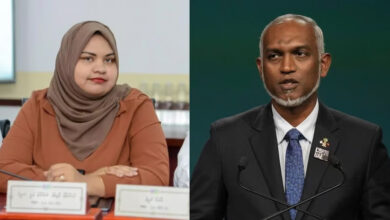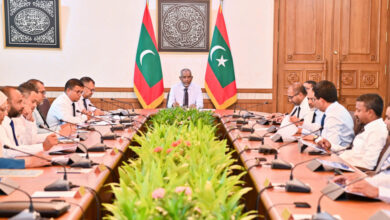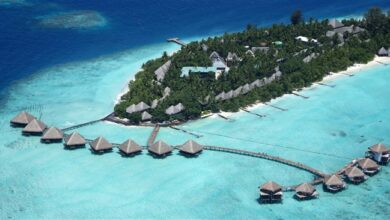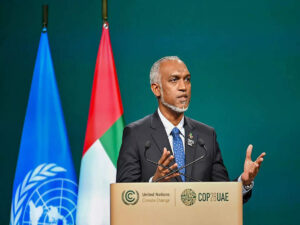
By N Sathiya Moorthy
With members of the new Parliament sworn in on May 28 as scheduled, Maldives’ President Mohamed Muizzu has his job cut out. Economy is the name of the game, and he has begun addressing those concerns, which are not as insurmountable as some in his government may believe.
In the 20th Parliament, Muizzu’s PNC-led coalition has 79 MPs for a total of 93, up from 89 after delimitation and pre-polls. That leaves only 12 opposition MPs and two independents after eight others joined the main government party, the PNC. Four MPs from three pre-poll allies of the PNC have also pledged support.
The maiden session of the new Parliament elected President Muizzu’s Special Advisor Abdul Raheem Abdulla, popularly known as Adhurey, as the Speaker and Ahmed Nazim as Deputy Speaker. Significantly, the new Speaker polled 71 votes, nine fewer than his deputy, who clocked 90 with Speaker Pro Tem ‘Sun’ Siyam, staying neutral in both.
The two Independents who had voted in favour of the opposition MDP candidate in the Speaker’s vote possibly sided with the PNC nominee in the deputy’s election. More importantly, there were seven ‘invalid votes’ in the Speaker’s election, all possibly of Muizzu’s PNC combined—this setting a minor storm in the teacup even before the House had commenced its regular business for the next five years.
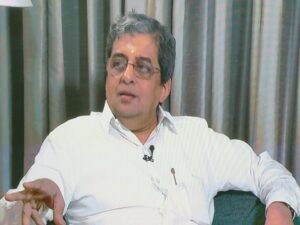
Debt-crisis
Truth be told, Muizzu has inherited a massive economic problem, which, if not bridled even at this late hour, could blow on the face of the nation, as it did in the case of neighbouring Sri Lanka only two years ago in 2024. Many Maldivians, especially those with family members working or living in Sri Lanka, suffered. Both the IMF and the World Bank had cautioned the predecessor government of MDP’s President Ibrahim Solih about an impending debt-crisis, a year before their marked deadline of end-2023. Nothing worse seemed to have happened at the time, but there was no great hope of good tidings either.
The incumbent’s promise of imminent goodies in the election year was matched only by the promises of his rival, who is now president. The new government has since blamed the predecessor for much of the nation’s economic ills, to which one should add the Covid lockdown and consequent downturn, starting with the mainstay tourism sector. Opinions differ if the previous government’s initiatives to boost and restore the post-Covid economy paid off or only served a failed electoral purpose.
Now in the sixth month after assuming office, President Muizzu has been addressing some of the economic issues that he promised to address during his twin poll campaigns. His government has been able to maintain the rate of inflation at three per cent, but how long it will work remains to be seen. Muizzu has also stuck to his poll-time promise of not printing more currency to keep the economy afloat. It had become kind of a cottage industry under the previous regime.
The reason is not far to seek. The outgoing Parliament, dominated by the MDP, passed a budget for MVR 49 billion for fiscal 2024 (January–December). The revenue projections stopped far low at MVR 33 billion. As president-elect, Muizzu seemed to have approved the budget. At least, his Transition Team, headed by the present Parliament Speaker, Adhurey, was not known to have made any major changes, whether on the spending side or the revenue side.
This gap is going to show sooner than later, unless the government now resorts to a massive hair-cut, rather tight-belting. With no new election in sight, Muizzu can try it out now, but by the time the nation-wide local council elections become due in two or more years, the economy should have recovered enough for him to claim authorship and ownership.
Overseas payment-cards
Right now, the open market/black market dollar rate has come down. In the Maldives, it is a measure of the popularity of the government, as common people and businesses alike, not to leave out government institutions, require forex for all purchases overseas. That includes higher education and healthcare.
Though the Muizzu government’s announcement to extend the ‘Aasandha’ health insurance to hospitals in Thailand and the UAE was aimed at attracting the upper middle class, the implementation has not commenced even months later. That may be indicative of problems that the scheme’s implementation faces outside of India and Sri Lanka, the immediate neighbours, where the facility was made accessible years ago.
Yet, economic measures alone need not be the cause for the lowering of the open market dollar rate, from MVR 18.30–18.50 to MVR 17.50–17.80, over the past months. According to insiders, some of it may owe to faceless backers of political parties pumping in dollars for the twin elections.
Some believe that the government’s new initiative to permit the use of India’s RuPay and China’s WeChat platforms for tourists from those countries visiting the Maldives The Bank of Maldives is also facilitating transactions in Chinese yuan and the UAE’s dirham. There have also been frequent mentions of allowing the use of India’s rupee, the Sri Lankan rupee, and a host of other currencies, though they may have to wait.
Some see it as a win-win situation, especially for the Maldives, whose dependence on the US dollar as the ‘reserve currency’, not only for government and other institutional transactions but also for use by individuals. The immediate hope is that the dollar rate in the open market may come down.
However, others argue that the nation can really breathe easy on the monetary front if and only if the local currency, rufiyaa, becomes stronger. For this to happen, they argue that the Maldivian economy should become stronger and the fundamentals should become stronger. This is not going to happen any soon, but it will be a good thing for the government to take the initiative, at least at this late stage, without waiting for a Sri Lankan kind of situation to overwhelm the nation’s economy.
Unless this happens and unless Indian and Sri Lankan shopkeepers, for instance, accept the Maldivian currency in large numbers, the Maldivian economy and banks will be stuck with foreign currencies that are accepted locally, but the reverse does not happen. This is because shopkeepers and traders in the UAE and China, and later in India and Sri Lanka, would not accept the rufiyaa unless they have use for it. Otherwise, they might mark up their prices if the payment is not in Indian rupees to provide for conversion into US dollars.
Real money-spinner
Tourism is the real money-spinner for the Maldives, but the tourism industry is also the real economic and monetary problem for the economy. No one wants to acknowledge it, but the legal siphoning off of the dollar earnings from the multi-billion-dollar resort business in the country, possibly to the overseas bank accounts of the promoters, both foreigners and locals, has been the bane of the nation since the tourism economy opened up in the late seventies.
In the early decade(s), the government of President Maumoon Abdul Gayoom made dollar-loading easy for overseas investors in the resort business and granted similar concessions to local investors. Successive governments have allotted ‘resort islands’ to friends and favourites of the incumbent president, with public sector financial institutions being ‘encouraged’ to lend them money.
The economy can find its feet and progress if and only if the bulk transfer of tourism dollars is stopped or the government applies legit brakes with a long-term timetable and work programmes in the matter. Finance Minister Mohamed Shafeeq sort of indicated it recently, but it is anybody’s guess if the government will have the courage and the institutional wherewithal to enforce any discipline in the matter.
According to those in the know, the cash cow in the tourism industry controls Maldivian politics, whoever is elected president, and whoever are the ministers and other regulators under the law. One reason attributed to incumbent Solih’s defeat in the presidential poll owed to his government hiking the tourism GST (TGST) from 12 to 16 per cent (and also the general GST from six to eight per cent), beginning January 1, 2023, only months ahead of the presidential polls.
The belief is that the tourism industry may hit back as one, though the chances of a reversal in the rates may not occur anytime soon. The proffered argument was that the industry suffered even more because of the TGST hike in the middle of the November-March tourism season as all resort bookings were made in advance under the old rates. That it happened not long after the post-Covid reopening of the world.
Though no one is talking about it openly, there are those who are quietly watching the government’s initiative, if any, in arresting the ‘fleeing’ dollar. If anything of the kind happened, it would have been a ‘revolutionary’ initiative, unparalleled in Maldivian economic history.
Their expectation is based on the fact that Muizzu, the first technocrat- president of the country, also represents a yet-to-be-popular generation of leaders cut off from decades of ‘incestuous’ politics, where personalities, not real policy changes alone, differed. Given that, barring the eight-and-a-half years of MDP rule, the rest of the long innings under Gayoom and Yameen were presented as pro-people ‘socialist’ dispensations, though here the former walked miles ahead of the latter, a poor shade.
Even in democratised Maldives since 2008, the elected ruler is made to feel as if he is a king, the sultan from the long past—the kind of ‘elected’ sultan that the nation tried out in the previous century and failed. The expectation is that Muizzu will not become one. The prayer is that he, too, should not become one.
Never-ending process
On the bilateral front, Indian High Commissioner Munu Mahawar and Ahmed Naseer, Ambassador at Large for the Maldives Ministry of Foreign Affairs, co-chaired the India-Maldives Review meeting on the Indian grant-funded High-Impact Community Development Projects (HICDP), involving 65 projects valued at MVR 360 million. This is apart from the $50 million rollover credit facility that India granted during Foreign Minister Moosa Zameer’s discussions with Indian counterpart S Jaishankar in New Delhi last month. This was a part of the debt restructuring request from the Maldives that needed instantaneous action on India’s part.
Here is the catch for any sensible Maldivian administration to look at. While Muizzu did return with Chinese grant aid in some sectors after his meeting with President Xi Jinping in Beijing in January, his government has also entered into agreements involving credit-based investments from other countries. This is even when the Chinese Embassy in Male said that they were looking at Maldivian requests for debt restructuring. As the Chinese envoy said, Beijing would be extending additional credit to the Maldives to pay back the old credit. As a result, the never-ending process will remain on paper for a long, long time to come, with no real relief for the debtor.
In Beijing, Muizzu and Xi Jinping decided for the Maldives to revive the bilateral FTA, hurried by the Yameen government (2013–18) but ‘buried’ by the successor Solih regime (2018–23). An FTA with India at the same time could help the Maldivian economy shore up, as an FTA with the two Asian giants would also mean ‘competitive politics’ between the two.
However, New Delhi has since denied Maldivian Economic Development Minister Mohamed Saeed’s claim that New Delhi had proposed a bilateral FTA alongside the SAFTA (South Asian Free Trade Agreement). If so, President Muizzu needs to find out if there was a miscommunication or if someone in his government, at some level, was playing mischief with ulterior motives, whose possibilities could be many.
At the same time, the Maldives under Muizzu will also have to balance the India-China strategic equation if he is serious about restoring the nation’s Indian ties. This is more so now that he has come out of the twin polls with flying colours. The temptation for anyone in his place would be to be overly assertive, both on domestic and foreign policy fronts. It does not help in these matters after a point, as ordinary Maldivians, like their leaders and government, know that one cannot choose one’s neighbours, with whom one needs to have cordial relations for all time to come.
This way, by shipping a second consignment of Tibetan water in large quantities, China cannot re-enact what India did at the height of the Male desalination plant fire in December 2014 to quench the city’s thirst for days together. As every Maldivian would know from his civilisation-centric history of generations and centuries, it is one thing for you to give another a fish periodically, but it is another thing for you to teach him fishing and also give him fishing gear.

